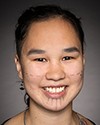I think that's, quite honestly, a ridiculous reason to say people will still be showing up at the ballot. Does that mean they shouldn't be able to vote in their language and should only be able to vote in Canada's official languages? I'm just confused.
Since this is a public meeting, we'd like Canadians to know, really, why this isn't being viewed as part of the scope. What we're talking about is ensuring that indigenous people.... If you look at the text, this encompasses everything so that people showing up at the ballot box with indigenous languages can request a special ballot so that there's access. They don't necessarily have to go to the ballot box and shouldn't have to. They should be able to request a special ballot before and get it in their language.
I don't think it's reasonable to say that it's going to take extra work, that it's going to take extra time and that it's not within the scope. That's the job of the federal institutions: to ensure that people can be a part of the voting process and can be a part of the democracy. It's, quite frankly, shameful to give me the excuse that it's outside the scope. It's in no way, shape or form outside the scope. It's like telling me that, because I don't speak a certain language, I can't be a part of certain things.
That's not what should be happening in Canada. That's, quite frankly, a really shameful excuse. Basically, what you're telling all indigenous peoples, all Inuit from Nunavut, is that they're not worth having their own language on their ballot when they show up to go and vote. This is not at all out of any sort of scope. It's well within the scope. It's well within talking about changes that should already be there, changes, again, we can be making right here, right now. It's ensuring that Inuit and indigenous people are able to vote when we're forced into an election. It's ensuring that we see true representation across the country.
How can we see true representation if not everybody is voting, if not everybody is giving their voice? Right away I'm saying that there are 60% of people whose mother tongue in Nunavut is Inuktitut. Right away you're saying that 60% of people are not worth voting in their language by not discussing this, by saying it's outside the scope.
I just would like to say on record—I'm glad it's on the record, first off. I'm glad this is public, and I'm glad we can see very point blank here again a committee saying it's not worth the time, it's not worth the effort and it's not in the scope, which isn't true. It's completely within the scope. It ensures that we include indigenous peoples in this. It ensures that we are promoting reconciliation and that we are promoting the surety that we have the representatives who should be there.
That's the thing. With such low voter turnout for majority-indigenous communities, are those the right people to be representing them? Did everybody in that riding have access to voting? The majority of indigenous communities don't vote, because of things like this. Here is a change, right here, right now, that we're able to make, and it's so important. We just want the same thing as the English and French get. We just want the same equality to voice our opinions and be a part of a democracy. To be saying this is out of scope.... It should already be happening.
Quite frankly, I don't think that's acceptable. I'm just glad the public can see that.
Matna. Thank you for letting me speak again.

